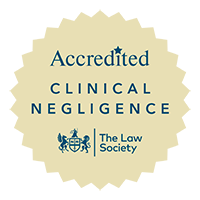Top ranked cerebral palsy claims lawyers

Boyes Turner’s cerebral palsy lawyers have secured a £3.25m lump sum settlement with annual cost of care payments of up to £320,000 for a 12-year-old girl with severe quadriplegic cerebral palsy and significant neurodevelopmental impairment. Our client’s brain injury was caused by the defendant hospital’s negligent management of her mother’s VBAC (vaginal birth after caesarean) labour.
Trial of VBAC labour guidelines were ignored
Our client’s mother had a previous history of emergency caesarean section when she became pregnant with the claimant. The hospital’s own guidelines for the management of VBAC delivery specified that following a caesarean section, any subsequent labour should be managed as a ‘trial of scar’ with continuous CTG fetal heart monitoring, close monitoring of the progress of labour, and that any abnormalities should be reported to the midwifery shift leader and obstetric registrar.
Our client’s mother was admitted to hospital at term with irregular contractions. Her admission CTG trace was normal and she was transferred to the labour ward. A few hours later, her waters broke spontaneously, draining clear amniotic fluid, and she started experiencing strong, regular contractions. This should have prompted the midwife to begin continuous CTG monitoring and to monitor the progress of labour on a partogram chart, but she failed to do so. As the mother experienced stronger and more painful contractions requiring Entonox and then an epidural for pain relief, the midwife again failed to start mandatory continuous CTG monitoring and close monitoring of the labour.
CTG monitoring was finally started four hours after the onset of regular contractions by which time the CTG trace revealed that the fetal heart rate (FHR) baseline was elevated, there was reduced baseline variability and frequent late decelerations, indicating that the baby was suffering from hypoxia (deprivation of oxygen). Despite the continued rise in the FHR, further deterioration in baseline variability and persistent late decelerations on the CTG trace the midwife failed to call for urgent obstetric assistance. By the time an obstetrician finally reviewed the labour the CTG trace showed late decelerations, complete lack of accelerations and no baseline variability – all signs indicating fetal distress.
After further delays, the baby was delivered by emergency caesarean section but had already suffered neonatal hypoxic ischaemic encephalopathy (HIE brain damage) and permanent disability. If our client’s mother had been correctly monitored and the abnormal signs on the CTG had been acted upon properly, our client would have been delivered in time to avoid her disability.
Admission of liability and £1.5m interim payments to provide for urgent needs
We investigated our client’s claim and served court proceedings on the defendant NHS trust which admitted liability without serving a defence. Judgment on liability was entered within six months of the issue of proceedings. As our client was too young for the full extent of her disability and future condition to be assessed, the proceedings were then adjourned. We secured interim payments totalling £1.5 million which helped her family pay for essential help with care, adapted accommodation, an adapted vehicle, necessary therapies, specialist equipment and special educational support.
When our client was old enough to be properly assessed, we worked with experts in paediatric neurology, care, occupational therapy, accommodation and education, and jointly instructed experts in speech and language therapy, physiotherapy, assistive technology and respiratory medicine to gain a full understanding of our client’s condition and future prognosis, and the costs of meeting her needs arising from her profound injury. We were then able to negotiate a settlement, structured to provide a lump sum with additional guaranteed, index-linked, lifelong, annual payments for care and case management, which was approved by the court.
Disability of the utmost severity
Our client has severe quadriplegic cerebral palsy with spastic and dystonic features, epilepsy, significant neurodevelopmental impairment, profound learning difficulties and profound motor impairment. Her vision and language are impaired and her parents communicate with her largely by touch. She has little understanding of cause and effect making it unlikely that she will ever be able to control her environment or communicate with assistive technology. She is fed entirely by gastrostomy. She will be totally dependent on others for all of her needs for the rest of her shortened life.
Parents’ testimonial
We are grateful to our client’s parents for their kind comments about the case:
“Having a new baby with medical difficulties is challenging. We didn’t know which way to turn and trying to understand where to go and who to speak with was a minefield. My boss, who knew what we were going through, was able to recommend that we speak with Boyes Turner. From the moment we made contact and over the many years since, their commitment and care to obtaining a settlement for our daughter has been outstanding. They have consistently managed our expectations and guided us through an extremely lengthy process. Susan Brown and her team are professional to the core. In the unfortunate circumstances of any family needing to take this route, we would strongly recommend contacting Boyes Turner.”
If you are caring for a child or young adult with cerebral palsy or neurological disability caused by negligence, contact us by email at cerebralpalsy@boyesturner.com.
They have a great deal of knowledge and expertise, and client care seems to be their top priority.
Chambers Guide to the Legal Profession
Contact our expert Cerebral Palsy solicitors today for support with your claim




